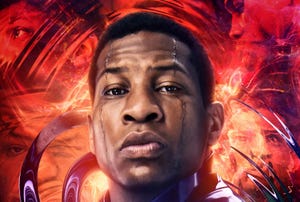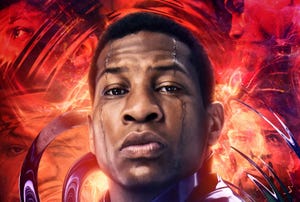
'Ant-Man and the Wasp: Quantumania' Post-Credits Scenes, Explained - CNET
Ant-Man and the Wasp: Quantumania landed in theaters Friday, kicking off Phase 5 of the Marvel Cinematic Universe by sending size-changing superhero Scott Lang (Paul Rudd) and his family on an intense journey into the Quantum Realm. It’s the third solo Ant-Man outing, the 31st MCU movie overall and has post-credits that may blow your mind.
“Ant-Man and the Wasp: Quantumania is a lot of fun, carried along by a charming gang of goofball heroes dropped into a weird and wonderful world to face a villain who’s big enough to change the entire franchise,” CNET’s Rich Knightwell wrote in his review. “The plot might not be anything innovative, but the trippy visuals and interesting themes prove that bigger isn’t always better.”
The quest puts Scott Lang in the crosshairs of Kang the Conqueror (Jonathan Majors), a time-traveling supervillain from the distant future who’s been teased as the next major danger to the Avengers. Let’s try to unravel the additional scenes and what they mean for the MCU. Multiversal SPOILERS ahead.

Mid-credits: Council of Kangs
In the wake of this movie’s Kang getting sucked into the malfunctioning multiversal engine core, a trio of Kang Variants discuss gathering their multiversal counterparts. Two of these guys resemble the ancient Egypt-ruling Rama-Tut and timeline-pruning Immortus as they appear in the comics, while the cyborg-looking guy may be based on the armored Scarlet Centurion.
They’re displeased that an Avenger killed Kang, whom they exiled to the Quantum Realm, and that the heroes are touching the multiverse — presumably a reference to the timeline tomfoolery of Spider-Man: No Way Home, Doctor Strange in the Multiverse of Madness and What If…?
“And if we let them, they will take everything we’ve built,” says the raspy Immortus, who seems like the trio’s leader. “So let’s stop wasting time. We’re late.”
He notes that he called “all of us.” Their chamber opens up to reveal a massive arena full of Variants — Kangs from branching timelines — of seemingly infinite temperaments and species, with even more arriving through time portals.
Seems Kang-tastic. What does this mean?
Our heroes will face an army of Kangs who want to dominate the multiverse. However, the Kang Variants we met in the Loki season 1 finale and this movie suggested that these guys don’t really get along, likely due to their megalomaniacal tendencies, so any alliance is likely to be shaky.

Kang’s objective, in a nutshell. Excellent supervillain pose too.
Marvel Comics
The same is true of the comic source material, where one Kang — Kang Prime — worked with some Variants to eliminate their counterparts. He then killed those allies and replaced them with robot doppelgangers to ensure his control over all timelines. It didn’t really work out for him though, because schemes that involve ruling multiple realities tend to spiral out of control.
It’s likely the same will be true of the MCU, but the fact that Avengers: The Kang Dynasty is scheduled for a May 2025 theatrical release suggests he (or they) will have some success. This movie’s Kang may return, since the multiversal engine core could have spat him out somewhere (or somewhen) else rather than killing him.
Post-credits: Loki’s hunt
We jump to the early 1900s, to find our old buddies Loki and Mobius (Tom Hiddleston and Owen Wilson) looking dapper as they attend the stage show of one Victor Timely — a guy who looks exactly like Kang.
“Time is everything,” says Timely, with supervillainous gravitas. “It shapes our lives, but perhaps we can shape it.”
Loki seems transfixed by this guy, but Mobius is less than impressed.
“You made him sound like a terrifying figure,” the Time Variance Authority (TVA) agent says.
“He is,” Loki responds.
Loki, hurray! Why is he in this?
When we last saw Loki in the season 1 finale of his self-titled Disney Plus show, his female Variant Sylvie threw him into a time portal and killed He Who Remains, a Kang Variant who managed the flow of time and prevented any branches.

He Who Remains wasn’t lying about being nicer than his Variants.
Marvel Studios
The timeline dictator’s death restored the multiverse and He Who Remains’ own Variants, which were kept under control by his efforts, were able to run amok again.
Loki ended up back in the drab offices of the TVA, where he tried to warn Mobius about the threat of many Kangs.
“Someone is coming. Countless different versions of a very dangerous person,” he tells Mobius and company. “And they’re all set on war. We need to prepare.”

Loki has apparently convinced Mobius to join him in chasing Kang.
Marvel
However, this version of Mobius can’t remember Loki. There’s also a statue of Kang wearing his comic costume towering over the TVA — it seems the God of Mischief was sent to a timeline in which the agency is controlled by a Kang Variant that’s cool with letting the timeline branch.
This movie’s post-credits scene suggests that he convinced Mobius to join him in his hunt for Kang.
But why is Loki after Victor Timely?
It’s unclear why Loki is hunting this particular Kang Variant, but it’s possible he’s a version of the character from earlier in his career. He might try to stop the villain’s career before it even gets started.
Once again, the upcoming movie Avengers: The Kang Dynasty suggests it won’t go smoothly. We’ll likely find out more in Loki season 2, which is scheduled to hit Disney Plus this summer.

Great suit, but Kang still gives off major supervillain vibes in his Victory Timely persona. It’s probably the puppet master pose.
Marvel Comics
In the comics, Victor Timely is an identity adopted by Kang Prime after he traveled back to 1901 and established the town of Timely, Wisconsin, as a safe haven from which he could hatch his schemes. He also seeded his futuristic technology into all kinds of machinery, planning to seize control over it later in the timeline. It also gave him a foundational role in the development of the Marvel Universe.
The name is also a bit meta since the company we know as Marvel Comics was established as Timely Publications in 1939. It only started going by Marvel in the ’60s.
It’s possible that the MCU Timely is also this continuity’s Kang Prime and hidden in an era where he can plan acts of villainy long before the Avengers exist to bother him. That’d explain why Loki is after him.
This guy could also be the same Kang we met in Ant-Man and the Wasp: Quantumania (the final battle left his fate unclear) — it’d be more narratively satisfying if the version of the character we spent time (ha) with turned out to be Kang Prime.
Another wrinkle is that comic Kang may be a descendant of the Fantastic Four’s Reed Richards/Mr. Fantastic and archvillain Doctor Doom (in-universe records are fuzzy though). Since the superteam is scheduled to make its MCU debut in 2025, it might lean into this connection.
It’s kinda hard to be sure what the deal with all these Kangs is when they all have the same face. At least it keeps the door open for Jonathan Majors’ MCU supremacy.


